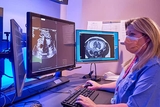

At the Richard D. Wood Jr. Center for Fetal Diagnosis and Treatment (CFDT), our goal is to optimize care for fetuses with potential neurologic diagnoses from in utero life to young adulthood. We start prenatally by performing a thorough evaluation of the fetus and providing support to the parents. In a same-day visit, we provide an ultrasound anatomic survey, fetal echocardiography, ultrafast fetal neurologic MRI and subspecialty consultation.
Harnessing fetal MRI
Part of the CFDT approach to evaluating fetuses with neurologic differences is evaluation with fetal neurologic MRI.
Our team of fetal neuroradiologists has developed optimal sequences for ultrafast fetal neurologic MRI. Additional information obtained via fetal neuro MRI includes:
- Detailed evaluation of the corpus callosum
- Evaluation for neuronal migrational disorders
- Visualization of the posterior fossa to optimally evaluate the status of the cerebellar vermis
- Evaluation for fetal intraventricular hemorrhage or occlusive stroke including surveillance after a cotwin demise in a monochorionic pregnancy
- Potential evaluation of the inner ear structures and optic nerves
We have found that the combination of fetal neurosonography and ultrafast neurologic MRI are complementary and aid in the diagnosis of complex neurologic differences.
Interdisciplinary consultation
For all patients, the consultation includes members from genetics and maternal-fetal medicine. Depending on the diagnosis, we also consult members from fetal and pediatric neurology and neurosurgery. During the discussion, we confirm the diagnosis, explain options for the pregnancy, review pregnancy and delivery management options, and make recommendations for ongoing care in partnership with the patient’s referring maternal-fetal medicine provider. If additional work-up is needed, we can help to arrange infectious or genetic testing or further imaging.
Pregnancy management
In cases with subtle neurologic findings such as mild ventriculomegaly, agenesis of the corpus callosum or inferior vermian hypoplasia, the patients return for local care and delivery and are offered postnatal follow-up with our pediatric neurology team for imaging and care. This includes ongoing care to ensure that milestones are met and that if early intervention or therapies are warranted, the infant/child gets the proper referrals to optimize their long-term neurodevelopment.
In cases with multiple anomalies, potential genetic diagnoses, or findings that are likely to require neurosurgical intervention shortly after birth, we discuss the option of delivery in our Garbose Family Special Delivery Unit to facilitate immediate subspecialty care after birth.
We also offer all patients with a fetus with a neurologic diagnosis inclusion in our fetal neurologic registry which is designed to compile postnatal outcomes to add to the often-sparse literature in an effort to improve prenatal counseling for the future.
Featured in this article
Specialties & Programs

At the Richard D. Wood Jr. Center for Fetal Diagnosis and Treatment (CFDT), our goal is to optimize care for fetuses with potential neurologic diagnoses from in utero life to young adulthood. We start prenatally by performing a thorough evaluation of the fetus and providing support to the parents. In a same-day visit, we provide an ultrasound anatomic survey, fetal echocardiography, ultrafast fetal neurologic MRI and subspecialty consultation.
Harnessing fetal MRI
Part of the CFDT approach to evaluating fetuses with neurologic differences is evaluation with fetal neurologic MRI.
Our team of fetal neuroradiologists has developed optimal sequences for ultrafast fetal neurologic MRI. Additional information obtained via fetal neuro MRI includes:
- Detailed evaluation of the corpus callosum
- Evaluation for neuronal migrational disorders
- Visualization of the posterior fossa to optimally evaluate the status of the cerebellar vermis
- Evaluation for fetal intraventricular hemorrhage or occlusive stroke including surveillance after a cotwin demise in a monochorionic pregnancy
- Potential evaluation of the inner ear structures and optic nerves
We have found that the combination of fetal neurosonography and ultrafast neurologic MRI are complementary and aid in the diagnosis of complex neurologic differences.
Interdisciplinary consultation
For all patients, the consultation includes members from genetics and maternal-fetal medicine. Depending on the diagnosis, we also consult members from fetal and pediatric neurology and neurosurgery. During the discussion, we confirm the diagnosis, explain options for the pregnancy, review pregnancy and delivery management options, and make recommendations for ongoing care in partnership with the patient’s referring maternal-fetal medicine provider. If additional work-up is needed, we can help to arrange infectious or genetic testing or further imaging.
Pregnancy management
In cases with subtle neurologic findings such as mild ventriculomegaly, agenesis of the corpus callosum or inferior vermian hypoplasia, the patients return for local care and delivery and are offered postnatal follow-up with our pediatric neurology team for imaging and care. This includes ongoing care to ensure that milestones are met and that if early intervention or therapies are warranted, the infant/child gets the proper referrals to optimize their long-term neurodevelopment.
In cases with multiple anomalies, potential genetic diagnoses, or findings that are likely to require neurosurgical intervention shortly after birth, we discuss the option of delivery in our Garbose Family Special Delivery Unit to facilitate immediate subspecialty care after birth.
We also offer all patients with a fetus with a neurologic diagnosis inclusion in our fetal neurologic registry which is designed to compile postnatal outcomes to add to the often-sparse literature in an effort to improve prenatal counseling for the future.
Contact us
Richard D. Wood Jr. Center for Fetal Diagnosis and Treatment